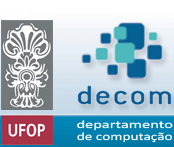

BCC406 - Redes Neurais e Aprendizagem em Profundidade - 2024-2Carga horária da disciplina: 4 horas/aula
Professor(es) em 2024-2
ObjetivosEmentaIntrodução a aprendizagem em profundidade; Noções básicas de redes neurais; Redes Neurais profundas; Fundamentos das redes neunais convolucionais; Modelos convolutivos profundos: estudo de casoBibliografia- RUSSELL, Stuart J.; NORVIG, Peter. Artificial intelligence: a modern approach. 3. ed. Upper Saddle River, N.J. : Prentice-Hall, 2010.- GOODFELLOW, Ian; BENGIO, Yoshua; COURVILLE, Aaron. Deep Learning. MIT Press, 2016. (http://www.deeplearningbook.org) - BISHOP, Christopher M.. Pattern recognition and machine learning. New York : Springer, 2006. - KOVACS, Zsolt Laszlo. Redes neurais artificiais: fundamentos e aplicações - um texto básico. 4. ed. São Paulo: Livraria da Fisica, 2006. - CASTRO, Leandro Nunes de. Fundamentals of natural computing: basic concepts, algorithms, and applications. Boca Raton: Chapman & Hall/CRC, 2006. Bibliografia complementar- BISHOP, Christopher M.. Neural networks for pattern recognition. Oxford: Oxford University Press, 2010.- BRAGA, Antonio de Padua; CARVALHO, Andre Ponce de Leon F. de; LUDERMIR, Teresa Bernarda. Redes neurais artificiais: teoria e aplicações. Rio de Janeiro: LTC, 2000. - HAYKIN, Simon. Redes neurais: princípios e pratica. Tradução de Paulo Martins Engel. 2. ed. Porto Alegre: Bookman, 2001. - THEODORIDIS, Sergios; PIKRAKIS, Aggelos; KOUTROUMBAS, Konstantinos; CAVOURAS, Dionisis. An Introduction to Pattern Recognition: A Matlab Approach. Publisher Academic Press, 2010. - BRATKO, I. Prolog Programming for Artificial Inteligence. 3. ed. Addison-Wesley, 2000. ISBN: 978-020140375. |
|||||||||||||||||||||||||
Departamento de Computação | ICEB | Universidade Federal de Ouro Preto
Campus Universitário Morro do Cruzeiro | CEP 35400-000 | Ouro Preto - MG, Brasil
Telefone: +55 31 3559-1692 | decom@ufop.edu.br